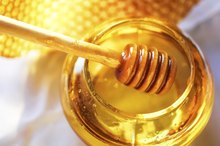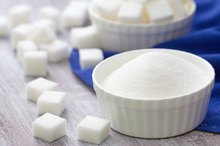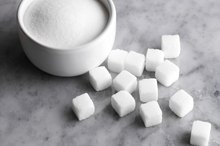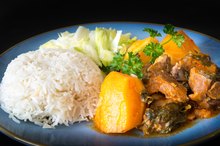Does the Fructose in Dried Fruit Cause Gas?
Dried fruits have the same nutritional value as fresh fruits, but in a concentrated form. The water content of the fruit is extracted during the dehydration process. As a quick source of carbohydrates, dried fruits make a convenient snack option. However, the natural fruit sugar in dried fruits can cause gas and flatulence a few hours after you eat them.
If you are experiencing serious medical symptoms, seek emergency treatment immediately.
Fructose Malabsorption
Fructose is a type of sugar that some people's digestive systems cannot absorb well 1. This problem, fructose malabsorption, can affect just about anyone at any age, and especially people with gastrointestinal conditions 1. The bacteria living in your intestines feed on the fructose your body is not able to digest, producing a lot of gas, which can cause bloating, cramps and flatulence 1. Diarrhea and constipation, or both, are also common symptoms of fructose malabsorption.
High-Fructose Dried Fruits
Carbohydrates and Stomach Problems
Learn More
All fruits contain fructose, but some have a very high proportion of fructose compared to the amounts of glucose or sucrose, other types of sugar also found in fruits. Dried high-fructose fruits can be especially problematic if you suffer from fructose malabsorption. Dried apples, pears, mangoes and cherries all contain high levels of fructose.
Dried Fruit Serving Size
Although dried bananas, blueberries, citrus fruits and strawberries are probably better than high-fructose fruits, it is still easy to overload on fructose with any dried fruits. Avoid eating large servings of dried fruit, even the safer fruit options, to prevent gas.
Assess Your Tolerance
Does Sugar Make You Bloated?
Learn More
If you enjoy dried fruits, you can determine how much fructose you can tolerate without experiencing gas and other gastrointestinal problems 1. Some people with fructose malabsorption can handle a very small serving size, such as 1 to 2 teaspoons, but tolerance can vary between individuals. Try small amounts of dried fruits with a lower fructose content to assess your own tolerance. Keep servings small and slowly build up to see what amount you can tolerate without experiencing gas.
- If you enjoy dried fruits, you can determine how much fructose you can tolerate without experiencing gas and other gastrointestinal problems 1.
Related Articles
References
- "The Low FODMAP Diet -- Reducing Poorly Absorbed Sugars to Control Gastrointestinal Symptoms"; Eastern Health Clinical School -- Monash University; 2011
- Popkin BM, Hawkes C. Sweetening of the global diet, particularly beverages: patterns, trends, and policy responses. Lancet Diabetes Endocrinol. 2015;4(2):174-186. doi:10.1016/S2213-8587(15)00419-2
- New Hampshire Department of Health and Human Services. How much sugar do you eat?. Updated August 2014.
- DeSilver D. How America's diet has changed over time. Pew Research Center. Updated December 13, 2016.
- Lakhan SE, Kirchgessner A. The emerging role of dietary fructose in obesity and cognitive decline. Nutr J. 2013;12:114. doi:10.1186/1475-2891-12-114
- Djiogue S, Nwabo Kamdje AH, Vecchio L, et al. Insulin resistance and cancer: the role of insulin and IGFs. Endocr Relat Cancer. 2013;20(1):R1-R17. doi:10.1530/ERC-12-0324
- Page KA, Chan O, Arora J, et al. Effects of fructose vs glucose on regional cerebral blood flow in brain regions involved with appetite and reward pathways. JAMA. 2013;309(1):63-70. doi:10.1001/jama.2012.116975
- Goran MI, Ulijaszek SJ, Ventura EE. High fructose corn syrup and diabetes prevalence: a global perspective. Glob Public Health. 2013;8(1):55-64. doi:10.1080/17441692.2012.736257
- Walker RW, Dumke KA, Goran MI. Fructose content in popular beverages made with and without high-fructose corn syrup. Nutrition. 2014;30(7-8):928-35. doi:10.1016/j.nut.2014.04.003
- American Heart Association. Added sugars. Updated April 17, 2018.
Writer Bio
Aglaee Jacob is a registered dietitian. She has experience working with people who have diabetes, cardiovascular disease, hypertension and obesity issues. Jacob obtained a bachelor of science and a master of science, both in nutrition, from Laval University in Quebec City, Canada.









